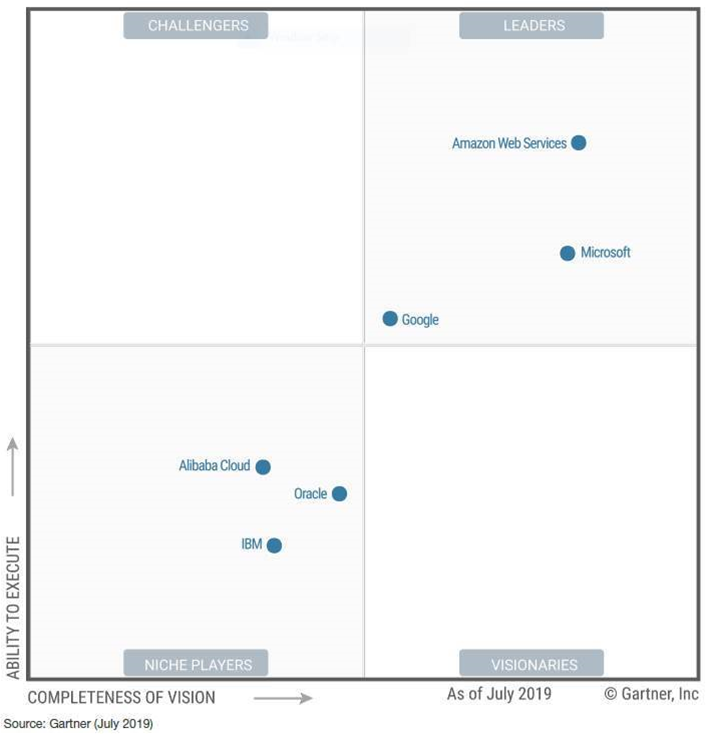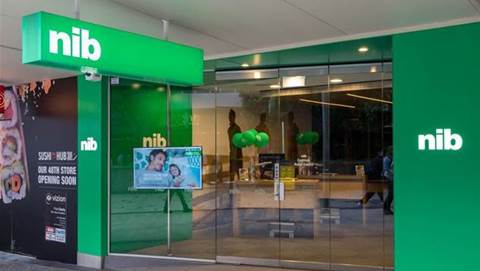Analyst firm Gartner has published its annual worldwide Magic Quadrant for Cloud Infrastructure as a Service, and found status quo in the cloud market.

That’s good news for the three vendors in the Leader’s quadrant – AWS, Microsoft and Google.
But it’s bad news for the three down in the niche players quadrant – IBM, Oracle and Alibaba – because Gartner doesn’t see them escaping any time soon.
Gartner believes Oracle has built an impressive cloud but that it is “primarily an infrastructure foundation for its other businesses.”
The firm cautions that “Oracle is unlikely to ever be viewed by the market as a general-purpose provider of integrated IaaS and PaaS offerings. This is due to the dominance of the hyperscale providers, Oracle’s late start with OCI, and the polarising nature of Oracle in the minds of developers who often are the leading influencers for public cloud IaaS.”
Of IBM, Gartner writes that it increasingly promotes hybrid cloud and “offers capabilities and tooling to enterprises, allowing them to choose the cloud environment that is best for their specific application requirements, positioning IBM Cloud as a niche or specialty offering during the selection process.”
If that’s the way IBM wants it, then fine. But IBM has signalled that it is rebuilding its IaaS offering and Gartner believes that effort has resulted in only “incremental improvements to the infrastructure services formerly under the SoftLayer umbrella” and has “not delivered on its fundamental goal — to produce a new set of cloud IaaS offerings based on the principles of hyperscale architecture.”
“Given this, it is unlikely that IBM will become a competitive public cloud IaaS provider.”
The firm also cautions that “Despite having many worldwide data centres, the IBM Cloud experience remains disjointed, as many features are available only in specific locations. This and an unexceptional user experience cause IBM to have a higher level of user dissatisfaction than other vendors in this research.”
Ouch.
Gartner found Alibaba’s cloud offers “an extensive set of public cloud integrated IaaS+PaaS offerings, comparable in scope to the service portfolios of other globally focused hyperscale providers.”
But not all of those features are offered outside China, making it less attractive.
The company is also bleeding cash.
“Alibaba Cloud’s financial losses are increasing and may prevent the company from continuing to invest in necessary expansions to serve international markets as the leading hyperscale provider,” Gartner’s analysts wrote.
Leaders have problems too
Gartner rates AWS “the most mature, enterprise-ready provider, with the strongest track record of customer success and the most useful partner ecosystem.”
But it also found three problems, calling out supposed price drops as illusory, and noting that the company’s determination to be first to market often means it launches “feature-poor services or services without deep cross-platform integration, which it often defers to the future to address. The quest to be first to market sometimes results in services that need years of substantial engineering updates.”
It also rates Amazon’s overall ambitions as a risk for AWS, as companies that anticipate Amazon becoming a competitor decided not to nourish the Amazon cloud by sending it any business.
Gartner praised Google for its “differentiated technologies on the forward edge of IT, specifically in analytics and machine learning”, but warned of its “immaturity of process and procedures when dealing with enterprise accounts, which can make the company difficult to transact with at times.”
The analyst firm also feels that Google’s direct and partner sales teams are small and immature compared to rivals, but notes aggressive efforts to fix that.
Which brings us to Microsoft, hailed for an excellent edge play thanks to its Azure Stack and Data Box products, plus the excellent on-ramp for those already using Microsoft development tools.
But Gartner cautioned that “Azure’s reliability issues continue to be a challenge for customers” and found that “Enterprises frequently lament the quality of Microsoft technical support (along with the increasing cost of support) and field solution architects. This negatively impacts customer satisfaction, and slows Azure adoption and therefore customer spending.”






















